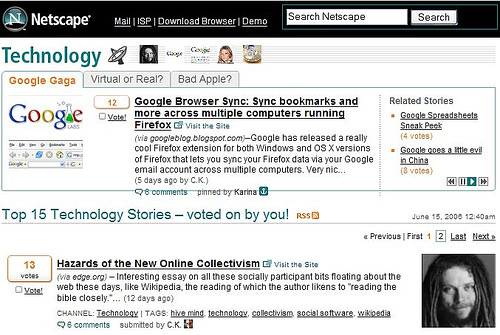Techcrunch has the scoop on the new
Netscape portal beta, which bears a
striking resemblance to Digg. Mike thinks it’s a “digg killer” and in
terms of pure numbers it may well be. Netscape gets a surprising 811 million
monthly page views, which digg is at around 200 M per month. But despite the
Digg-ish features, the new Netscape portal is still trying to keep users onsite
and also gives them less control over what content ranks highly.
The Tech frontpage. Note the top link – about the “hazards” of
online collectivism.

Some points to consider:
1) The headline link is to the comments page on the Netscape site, while the actual
originator of the content gets the secondary links (the ‘via’ link and
the ‘Visit the site’ link, which opens up in a new window). The editors also
sometimes provide commentary on the articles (“Netscape Anchor
Commentary”), which tends to deflect attention away from the article
itself. These are subtle things, but it’s obvious the objective is to keep Netscape users
inside the Netscape site. This of course exposes users to the multitude of ads on
Netscape, rather than send them away to the actual sources of the
content. Seems a bit portal-ish to me.
2) While users votes count in determining what gets displayed, Netscape editors
(aka “anchors”) choose what gets to the top of the front
pages. Will they favor mainstream publications? Will they not promote anti-AOL
stories? Will they… etc etc. You can see how this might open up any number of
claims of bias.
3) Generally speaking I’m not convinced about the relative merits of editors/anchors over the more
democratic (but admittedly problematic at times) ‘wisdom of the crowd’. I
noticed this comment from Jason Calacanis on the
‘Hazards’ story:
“[…] what we’re doing with Netscape is exactly what he’s looking
for: an editorial voice to balance the hive mind. Our Anchors are the
balance to the limitations of the crowd–and vica versa!”
(emphasis mine)
While I’ve been as vocal as anyone about the mob mentality occasionally shown at
digg – I wonder whether the opposite approach of using editors to determine
ranking and lead discussions is really the answer for so-called community sites.
It’s inherently less democratic, even if it ends up being more effective. I
guess time will tell, but at the
very least it’s an interesting experiment. I can’t see any current Digg users
defecting, but perhaps Digg should hurry up with those new features it’s
been promising!
















